The 2nd Mechanised Battalion “Pume“ (based in Našice) in early August welcomed new members for…
Training of Future Combat Leaders’ Instructors
 In less than two months, the Marko Babić Leadership Development Centre will become operational and highly motivated, competent leaders will be trained there, as was once the custom at the Damir Tomljanović Gavran Guards Brigades’ Specialist NCO Training Centre. Preparations for the reception of the first trainees at Josip Jović Barracks in the central Croatian town of Udbina are in overdrive. The main objective of the newly constituted centre is the development and strengthening of the Croatian Armed Forces’ NCOs and officers. The centre will be commanded by Lieutenant Colonel Tomislav Kasumović, who recently returned from schooling in the USA. In an interview for CROMIL, Lieutenant Colonel Kasumović expressed his gratification over the chance to lead the newly-constituted centre which will be a giant leap in the development of the Croatian Armed Forces.
In less than two months, the Marko Babić Leadership Development Centre will become operational and highly motivated, competent leaders will be trained there, as was once the custom at the Damir Tomljanović Gavran Guards Brigades’ Specialist NCO Training Centre. Preparations for the reception of the first trainees at Josip Jović Barracks in the central Croatian town of Udbina are in overdrive. The main objective of the newly constituted centre is the development and strengthening of the Croatian Armed Forces’ NCOs and officers. The centre will be commanded by Lieutenant Colonel Tomislav Kasumović, who recently returned from schooling in the USA. In an interview for CROMIL, Lieutenant Colonel Kasumović expressed his gratification over the chance to lead the newly-constituted centre which will be a giant leap in the development of the Croatian Armed Forces.
“I am glad that the system has recognized the need to develop leaders on all levels because it is our duty to lead soldiers through all tasks assigned to them. The need to develop leaders, isolate them and give them a demanding task in a controlled environment has been recognized. It is important to bring soldiers into a situation in which it is not easy to make a decision quickly and allow them to make a mistake. It does not matter if they err, so long as they understand why the mistake happened. Soldiers need to be exposed to such a challenge and the amount of stress that comes with it. Should they ever find themselves in a situation in which they need to decide quickly, they will be already used to the stress and will know how to act. It is important that combat conditions in the centre mimic real life and push soldiers to their physical and mental limits. Being a leader is about character development and character cannot be developed in smooth seas. In other for character to develop, one needs to see how one reacts to heavy seas. There is a clear vision of what is to be attained with the centre and I am glad I get to be a part of that vision,” said Lieutenant Colonel Kasumović.
The centre’s current concept foresees the development of trainees into leaders during a six-week training programme. The commander of the centre underlined that a true leader could not be developed in the envisaged six weeks. Rather, the guiding principle was to make the trainees ponder the role of a leader and their tasks so as to develop throughout their careers.
“The course is intended for the best members of the Croatian Armed Forces who have proven to the system that they deserve a chance and the responsibility to lead their subordinates. Udbina will be the starting point for their subsequent career path. While devising this concept, we wanted to merge three elements: the soldiers’ combat skills, leadership abilities and psychophysical capabilities. The centre is at the three-tier intersection of those elements. We do not want to push any of those elements to the extreme because the Leadership Development Centre is not a place for the development of special forces, but a modern system based on the former Guards Brigades’ Specialist NCO Training Centre at Šepurine,” says Lieutenant Colonel Kasumović while explaining the vision and objective of the Leadership Development Centre.
According to Lieutenant Colonel Kasumović, the training will be demanding and will reach its climax in a 100-kilometre march from Udbina to the Knin Fortress, where trainees will receive certificates of completion and badges in a formal ceremony. The trainees will also vote for the best trainee. The current concept foresees three training cycles a year, with 60 members of the Croatian Army’s units set to take part in the inaugural cycle.
“Every day, trainees will be assigned various roles and given different challenges because we want to see them think, make decisions, mistake, recognize mistakes and not repeat them. The centre’s team is comprised of select soldiers who fought in the Homeland War and have been educated abroad. We must develop. Technology has developed. Security threats and warfare tactics have changed. The concept of a leader must change and develop. This is an ideal place for honing leadership skills and I hope it will be a success. We want trainees to feel proud of having completed the training at this centre and honoured to be a part of a tradition started by Marko Babić. We want to pass the spirit of a Croatian warrior onto younger generations who have not fought in a war and have never served abroad. The training here is an ideal preparation for such challenges,” Lieutenant Colonel Kasumović concluded.
In order for them to acquire necessary skills and knowledge as well as become resolute, adaptable, highly motivated, physically and mentally prepared, competent leaders, trainees at the Leadership Development Centre will need instructors. Training for the centre’s instructors was conducted in the Udbina barracks from 1st to 19th July. Speaking about the training of prospective instructors, the centre’s commander said: “We want to develop instructors who will breathe as a single body. When trainees arrive, we want them to realize that the instructors in front of them command great respect for their knowledge. The instructors hone their skills at the training, which is an opportunity for them to become acquainted with each other, get an insight into their own strengths and weaknesses and improve whatever needs to be improved before the first class of trainees arrives.”
Eleven trainees, ten of whom are prospective instructors, finished the training programme. Some trainees applied voluntarily, while others were chosen from the ranks of the Croatian Army’s NCOs with rich training experience. They are members of the Guards Mechanized Brigade, Guards Armoured Mechanized Brigade, Combat Training Centre, International Military Operations Centre, Special Forces Command and Basic Training Centre. The centre’s prospective team of instructors is a combination of youth and experience. Some future instructors have rich experience from the Homeland War (1991-1995) and were trained at the former Guards Brigades’ Specialist NCO Training Centre at Šepurine, while others contribute to the team with their youth. They were mentored by an experienced staff of instructors from the Croatian Armed Forces who acquired their skills at the Damir Tomljanović Gavran Guards Brigades’ Specialist NCO Training Centre and in the special forces. The concept of the prospective instructors’ training was explained by Command Sergeant Major Krešimir Maslać, a senior instructor in the Cadet Battalion.
“In the first week, older instructors gave lectures to future instructors about training at the centre and the expectations of it. They covered topics from the programme areas defined by the leadership development training programme. The main objective is to pass the knowledge required for conducting training to the centre’s prospective instructors,” said Command Sergeant Major Maslać.
The following week, the secondary training group – cadets of the Cadet Battalion’s 3rd Cadet Company – arrived to the Udbina barracks to play the role of the centre’s future trainees.
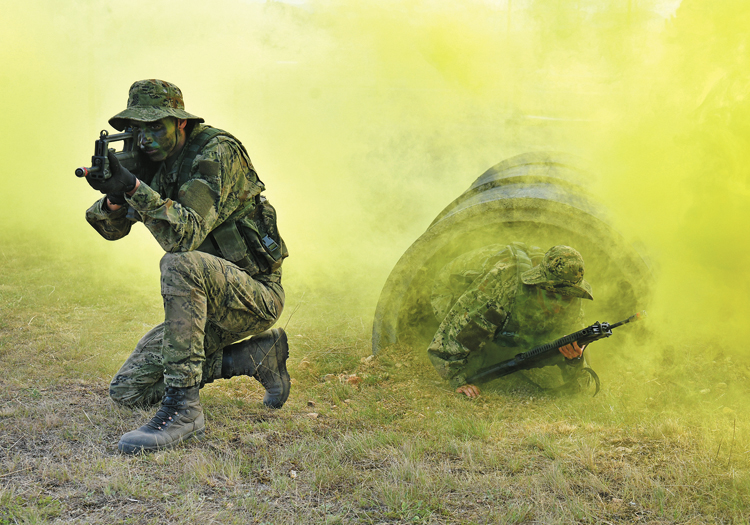 “The prospective instructors implemented the programme of Summer Camp 2, with the intensity of the training being adjusted to the Cadet Battalion’s needs. They were evaluated after each class with the cadets. This was not a regular summer camp for the cadets, but we stuck to all the topics that should be covered at Summer Camp 2,” said Command Sergeant Major Maslać, stressing that he was quite pleased with the cadets’ instructors and observing that that the cadets were happy with their instructors, as well. He also mentioned that some of the prospective instructors had previously been trained at the Guards Brigades’ Specialist NCO Training Centre at Šepurine, where he had also worked as an instructor. The comparison of the centre in Udbina with the one at Šepurine was inevitable, so we asked the head instructor how the former differed form the latter.
“The prospective instructors implemented the programme of Summer Camp 2, with the intensity of the training being adjusted to the Cadet Battalion’s needs. They were evaluated after each class with the cadets. This was not a regular summer camp for the cadets, but we stuck to all the topics that should be covered at Summer Camp 2,” said Command Sergeant Major Maslać, stressing that he was quite pleased with the cadets’ instructors and observing that that the cadets were happy with their instructors, as well. He also mentioned that some of the prospective instructors had previously been trained at the Guards Brigades’ Specialist NCO Training Centre at Šepurine, where he had also worked as an instructor. The comparison of the centre in Udbina with the one at Šepurine was inevitable, so we asked the head instructor how the former differed form the latter.
“The centre in Udbina is in its infancy, whereas the centre at Šepurine was based on the immediate experience from the Homeland War. We were young and the times were different. The pace was much faster back then; we will not be forcing such a fast pace today. Our objective is to teach prospective leaders how to be role models to their subordinates and how to lead them upon their return to their units,” Maslać replies.
The question about the prospective instructors’ physical fitness arose and the heads instructor at the training readily replied: “Although the trainees are older in age, their physical and mental skills are better now than 20 years ago. They are still in shape. They have acquired many skills in the last two decades. They had no problems meeting the requirements for the training.”
The centre’s staff pointed out that the future instructors met the standards for their age group. As far as skills and knowledge of individual programme areas are concerned, they were second to none in the Croatian Armed Forces.
The climax of the instructors’ training and Summer Camp 2 was a 36-hour final exercise, which was followed by an analysis of both activities’ preparation and execution. After the analysis, the prospective instructors received certificates of completion and badges.
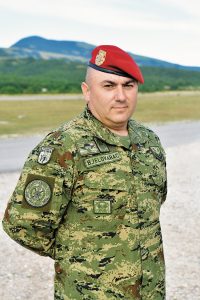 First Sergeant Mato Bjelovarac, Command Senior Enlisted Leader of the Leadership Development Centre, emphasized that the objective of the training was for prospective instructors to take charge of a platoon and train cadets. They were supervised by their own instructors, who correct their mistakes.
First Sergeant Mato Bjelovarac, Command Senior Enlisted Leader of the Leadership Development Centre, emphasized that the objective of the training was for prospective instructors to take charge of a platoon and train cadets. They were supervised by their own instructors, who correct their mistakes.
“The pace is slower at the moment because the instructors are preparing for upcoming courses. The demanding, fast-paced training awaits real trainees. Upon the completion of the training, the trainees will have to be capable of leading their subordinate soldiers and organizing their training. All prospective instructors have completed training at the Guards Brigades’ Specialist NCO Training Centre at Šepurine and abroad. Most of them have also served in international military operations. Now, they are passing their experience onto others,” said First Sergeant Bjelovarac, who had also completed the extremely demanding training at Šepurine.
“Up to 600 candidates were admitted to the tests, but only a hundred or so were chosen for the training. The competition was massive. The training comprised helicopters, repelling, mines and explosive ordnance, topography, daytime and night-time marches, etc. We would walk 50-60 kilometres every day. Just like in Udbina, we were on our feet from 5 a.m. to 10 p.m.,” reported First Sergeant Bjelovarac, concluding that the physical fitness and readiness of every prospective instructor were above average.
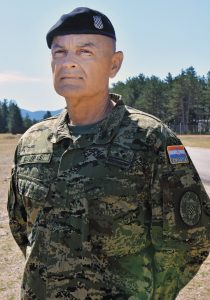 Colonel Željko Ljubas, Commander of the Fran Krsto Frankopan Training and Doctrine Command
Colonel Željko Ljubas, Commander of the Fran Krsto Frankopan Training and Doctrine Command
“All tasks connected with the formation of the Marko Babić Leadership Development Centre are being carried out in conformity with the plan of action and milestones, just like the construction works on the accommodation and training facilities. A team comprised of the Croatian Armed Forces’ most capable members is currently training the Leadership Development Centre’s prospective instructors. This month, we shall also select candidates for the pilot training, which is set to commence in September.”
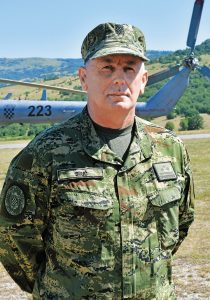 Colonel Nediljko Sirić, last commander of the Damir Tomljanović Gavran Guards Brigades’ Specialist NCO Training Centre
Colonel Nediljko Sirić, last commander of the Damir Tomljanović Gavran Guards Brigades’ Specialist NCO Training Centre
“My role in the formation of the Leadership Development Centre is to advise and assist Lieutenant Colonel Tomislav Kasumović, the new commander, in the transition from Šepurine to Udbina. My tasks also include helping him plan and develop the new centre as well as plan and conduct training. The two centres’ tasks are different, the weapons are different and the times are different. After Operation Maslenica, General Ante Gotovina founded the Guards Brigades’ Specialist NCO Training Centre for the training of platoon leaders and squad leaders. Later, we took the training a step further and established the Special Combat Skills Centre, where we conducted specialized training in skydiving, mines and explosive ordnances, diversion, sharpshooting, etc. Commando training was the peak. In the new centre, leaders will be trained.
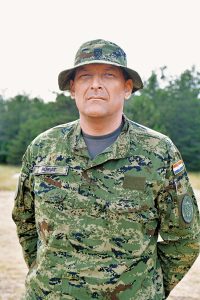 First Sergeant Davor Horvat, future instructor at the Leadership Development Centre
First Sergeant Davor Horvat, future instructor at the Leadership Development Centre
“Although rules and needs are different today, I hope the new centre will be as successful as the one at Šepurine. I will give it my all to accomplish the main objective – the development of leaders in the Croatians Armed Forces. I was a trainee at Šepurine 24 years ago. The training at the new centre will be very demanding and I doubt everyone will be able to complete it. I expect prospective trainees to be highly motivated, disciplined and willing to be the leaders of NCOs in the Croatians Armed Forces in the future. The cadets are a part of a pilot project; we hone our skills on them and acquire some new ones. They are young and have not experienced such training before, but they are handling it well, considering that they are not experienced soldiers, unlike the centre’s future trainees.”
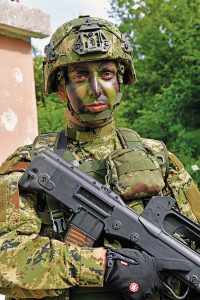 Cadet Corporal Helena Zec, Sophomore Year of Military Leadership and Management
Cadet Corporal Helena Zec, Sophomore Year of Military Leadership and Management
“Summer Camp 2 is more intensive than Summer Camp 1. We are upgrading our existing knowledge while learning something new. We are honoured to take part in the training of the Marko Babić Leadership Development Centre’s instructors. They are great; they teach us how to be regular soldiers, but also how to think like leaders. We shall become officers one day and we have to bear in mind the feelings of our subordinates. The training is intensive, but worth the effort because one learns a lot and acquires many skills.”
Text by MARTINA BUTORAC
Photo by TOMISLAV BRANDT
Translation by IVA GUGO
